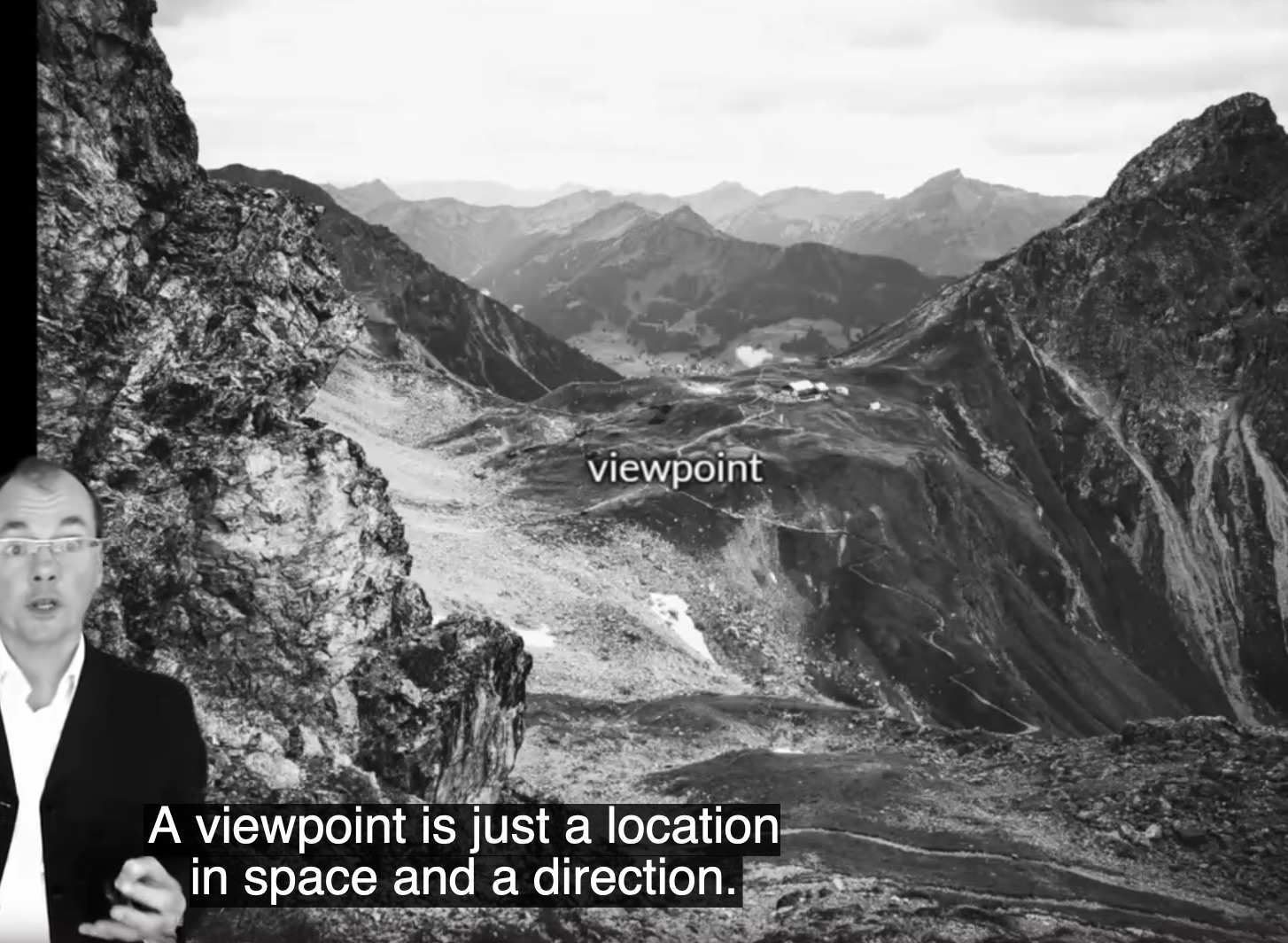Click here and press the right key for the next slide (or swipe left)
(This may not work on mobile or ipad. You can try using chrome or firefox, but even that may fail. Sorry.)
(If the slides don’t work, you can still use any direct links to recordings.)
also ...
Press the left key to go backwards (or swipe right)
Press n to toggle whether notes are shown (or add '?notes' to the url before the #)
Press m or double tap to slide thumbnails (menu)
Press ? at any time to show the keyboard shortcuts
Philosophy is done by asking questions.
viewpoints

Hemli
When describing a ‘viewpoint’, what do you mean by the term ‘location space’? Does this just mean it has a location in the universe?
Silvana
‘I was wondering what the nature of a viewpoint is. Is it just physical or also cultural and emotional etc?’
Naren
Could we ‘take the meaning of a viewpoint to not just be a physical location and direction, but a psychological or emotional viewpoint, like a position in a certain situation concerning the person them self’?

Silvana
And if a viewpoint took into account all the complex individual conditions, couldn't it eventually coincide with point of view?’
Naren
... In this case would a viewpoint be the same as a point of view (I know I'm cheating by changing a definition but is this just a thought).
Angela
i’d interpret the word viewpoint as the idea of having an opinion on something? and clearly not every being has an opinion on every single thing, so does this mean they do not have a viewpoint?
acquaintance
Amrita
We can’t see Caesar in person but we could perceive him once we’re shown an image .
Peter C
How do we have knowledge of things that cannot be seen unaided but only through scientific equipment?

Peter C
Is there any reason why we should think that perceptions/acquaintances are not themselves thoughts?
Campbell, J. (2002). Reference and Consciousness. Oxford: OUP
knowledge by description
Amrita
if we were originally clueless as to who Caesar is, he can’t be linked without description in the first place.
I want a photograph with the first puffin on the moon.
Lola
What are the relationship between knowledge by description and knowledge that rests upon acquaintance as its foundation ?
massive reduplication

Sam C
a more in depth description of massive reduplication would be massively appreciated.




Thomas B
If massive reduplication is true then surely we would never succeed in thinking [kicking] about some things because that thought [kicking] would be happening elesewhere in the universe about a duplicate object.
Thomas B
If massive reduplication is true and everything was duplicated then wouldn't every object still be unique as it occupies a different place in space and time,
meaning knowlege by description is possible?
The puffin nearest to here.
--- Perry, J. (1979). The problem of the essential indexical. Nous, 13(1):3–21.
Brigita
I am confused about the concept of 'not thinking about anything' - does this mean having low quality, un-self-aware thought or not literally not thinking at all? If it is the latter, how is that possible?
Florence
In the massive reduplication argument, I don’t understand how 4 follows from 2&3.
Silvana
the 3rd statement is that massive reduplication is real for all we know, and the 4th is that therefore we may not ever be thinking of anything. I am a bit confused on how these two statements are connected.
Hemli
it seems there is a jump from point 3 to 4 that i do not understand - why would the existence of Massive Reduplication mean that we may not ever be thinking about anything for all we know? Surely we would still be thinking, just inaccurately?
1. Suppose you were not acquainted with anything at all.
2. Then all your thoughts would be based on knowledge by description.
3. But massive reduplication is possible for all we know.
4. Therefore: you might not ever be thinking about anything, for all we know.
Sam C
There seems to be holes throughout that are leaving blanks in the argument for me.
Would it be possible to break down and explain these steps and how they link more thoroughly please?
Silvana
Could you expand a bit on the 5th argument, I'm still not quite sure how we know that we ever 'succeed in thinking about some things'?
1. Suppose you were not acquainted with anything at all.
2. Then all your thoughts would be based on knowledge by description.
3. But massive reduplication is possible for all we know.
4. Therefore: you might not ever be thinking about anything, for all we know.
5. But we do know that you sometimes succeed in thinking [kicking] about some things.
6. Therefore you are acquainted with at least one thing.
Nathan
I noticed when writing the essay that I’m not actually 100% what argument massive reduplication actually puts across?
Adam
How does the idea of massive reduplication actually support the logical argument that if there is no acquaintance, we could not ever be thinking about anything?
Luke
In the Argument from Massive Reduplication, the conclusion states that we are acquainted with at least one thing. How can this argument be developed to show that all knowledge of things are essentially constructed from acquaintance (Russell’s Principle if Acquaintance)?

Extra Questions
[email protected]
misc
Hemli
When writing my notes, can I use the terms ‘mind-having’ and ‘perceiving’ interchangeably or is there a massive distinction I am missing?
knowledge by description
‘when we know that the property or properties in question belong to one object and no more, we are said to have knowledge of that one object by description, whether or not we are acquainted with the object.’
\citep[p.~220]{Russell:1910fa}
Russell, 1910 p. 220
Malikah
where he states 'whether or not we are acquainted with the object' does that not support the principle of acquaintance rather than going against it?
I was just wondering because the knowledge of an object by description can come from acquaintance too?
acquaintance
Sam W
In regards to Russell's principle of acquaintance, as well as the concept of failure to think, they both regard our thoughts as necessarily thinking about physical things (as they refer to us 'not thinking about anything at all, if we dont). If we considered us only being able to think about mental objects [abstract objects]
(which we construct based on our understanding of physical objects or fantasical objects), would that make sense as a potential counter-point to Russell?
I am just [...] trying to combat the view that we think about physical things, rather than just our mental projection of physical objects
[...] i dont want this to come off as being more scepticism
thinking about nothing
Sam T
if you add 'on this specific planet' to your description of the thing you are acquainted with, would that defeat the premise of massive reduplication?
Ben C
surely the vocalist and the duplicate vocalist would be different things. Is not the location of an object part of what makes that object unique?
Peter C
If everything bottoms out into acquaintance, then it would seem that you cannot have scientific theories of objects un-observable to the naked eye This seems to mean that Russell cannot actually believe that Atoms etc are real, or could be known, because there is no direct cognitive relation between us and the objects in question .
McKenna
If you are thinking about something, and then turns out that you are thinking about something incorrectly (such as in the case of the vocalist), then surely that it false thinking rather than no thinking, as you are still having thought processes?
‘The vocalist is doing better today than she was yesterday.’
Peter C
But cant we just say that if you are thinking about nothing you are still thinking, but just about nothing?
Like we can think about nothingness or non-existence, so cant we think about non-existents?
There is nothing I am afraid of.
I am afraid of nothingness.
I am afraid of daeva, but daeva do not exist.
the massive reduplication argument
Sam T
I can't fill in the gap as to why knowledge by description leads to 'you may never know anything'
1. Assume: there is massive reduplication.
2. So: all your descriptions pick out at least two things
3. Assume: the link between a thought and an object it is about depended on you having a description which uniquely picks out that object.
4. Then: none of your thoughts would be linked to any objects at all.
Frank
I’m not quite certain on how the idea of massive reduplication fits into the proof of the acquaintance principle
Marcus
step 5 to step 6 already assumes the principle of acquaintance?
1. Suppose you were not acquainted with anything at all.
2. Then all your thoughts would be based on knowledge by description.
3. But massive reduplication is possible for all we know.
4. Therefore: you might not ever be thinking about anything, for all we know.
5. But we do know that you sometimes succeed in thinking about some things.
6. Therefore you are acquainted with at least one thing.
making connections
Munthasir
does causal dualism (Descartes’ views on relationship between Mind and Body) fit into Russell's principle of acquaintance because in a sense the relationship between mind and body could be in the form of acquaintances?
‘saying that the mind is physical (or emergent) does not tell us very much about which of the many physical (or emergent) things it is’
Crane 2001, p. 69
Nischhal
Is Russell's principle empiricist? The acquaintance and description principles seems to me to be quite close to David Hume.
Mark S
If we are to believe in the veil of perception, does that diminish the extent to which we are acquanted with something?
‘Imagine you are looking at a lemon and you demonstrate it (not an idea or sense-datum), forming a belief you express by saying 'that is there'. Do you need to rely on having reason to hold other beliefs to reasonably form so simple a belief as that? The [...] challenge for indirect realism is whether it can allow for perceptual beliefs to be non-inferentially justified, that is, justified by experience alone. This problem of non-inferential justification is, arguably, the best formulation of the traditional 'veil of perception' worry.’
Silins 2011, p. 330
1. View X implies there is a veil of perception.
2. But there is not.
3. Therefore, View X is false.
Philosophy is done by asking questions.